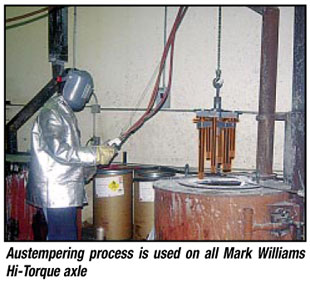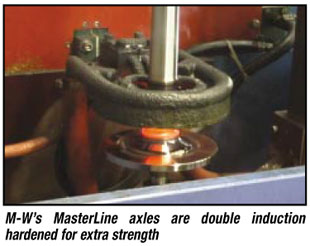Toll Free: 1-866-508-6394
OR Contact Us
OR Contact Us
Shop by Category
| When selecting the kind of axles to use in your race car (or street machine) there are several factors to contend with. They include determining how much of a load will be placed on the axles at launch, driveline weight considerations, and budget. The amount of torque that’s applied to an axle is calculated by taking the engine torque output and multiplying it by both the transmission first gear and rear end gear ratios. So it’s not unusual to see over 10,000 foot lbs. of torque transmitted to the axles.  With these kind of loads there’s more to it than the tensile strength of the material. The ductility of the axle shaft itself plays an important role, as the torsional load is so great that the axle must be able to twist and rebound like a torsion bar rather than be too stiff and snap. With these kind of loads there’s more to it than the tensile strength of the material. The ductility of the axle shaft itself plays an important role, as the torsional load is so great that the axle must be able to twist and rebound like a torsion bar rather than be too stiff and snap.To achieve this kind of ductility Mark Williams Enterprises exclusively employs the Austempering process on its Nickel-Chromium-Molybdenum alloy Hi-Torque axles. This heat treating process involves submerging the axle in a molten solution at over 1300 degrees (F) and then quenching them in a molten brine solution. This results in a material structure known as Bainite —far superior to the Martinsite structure that comes with the ordinary heat treating and oil-quench process commonly employed by other manufacturers that results in a more brittle axle. Other important benefits of Austempering include the axles having higher impact and fatigue strengths, a resistance to hydrogen embrittlement, and having a more uniform hardness plus increased wear resistance. Needless to say, this elaborate process does have an impact on price —but it makes for a far superior product that can pay dividend in long-term reliability. |
 For applications where impact loads are less severe M-W, serves up its MasterLine axles. These are made from a High Manganese steel that is superior to the material used to make OEM axles that is employed by other manufacturers in their “high performance” axles.Again, heat treating comes to the forefront. For its MasterLine series of axles (recommended for cars going 9.90 or slower in the quarter mile) M-W uses an induction hardening process. And while some manufacturers send their heat-treating out to vendors, Mark Williams Enterprises has invested in sophisticated state-of-the-art equipment to do this critical process in-house. Moreover, the axles are actually double induction hardened, which accounts for a deeper core hardness.Bottom line…through employing superior heat-treating processes Mark Williams Enterprises is able to provide racers with stronger, more durable axles. And it’s driveline reliability that can spell the difference between winning and losing a race. For applications where impact loads are less severe M-W, serves up its MasterLine axles. These are made from a High Manganese steel that is superior to the material used to make OEM axles that is employed by other manufacturers in their “high performance” axles.Again, heat treating comes to the forefront. For its MasterLine series of axles (recommended for cars going 9.90 or slower in the quarter mile) M-W uses an induction hardening process. And while some manufacturers send their heat-treating out to vendors, Mark Williams Enterprises has invested in sophisticated state-of-the-art equipment to do this critical process in-house. Moreover, the axles are actually double induction hardened, which accounts for a deeper core hardness.Bottom line…through employing superior heat-treating processes Mark Williams Enterprises is able to provide racers with stronger, more durable axles. And it’s driveline reliability that can spell the difference between winning and losing a race. |
 |